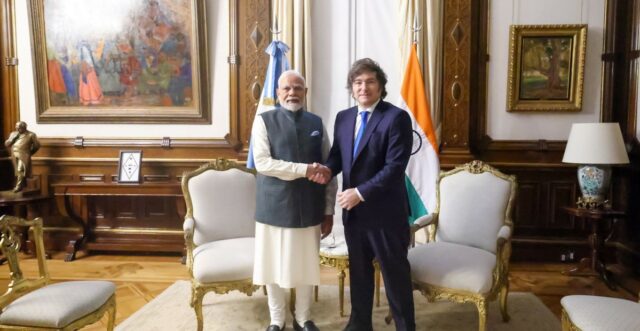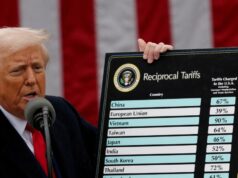
Indian Prime Minister Narendra Modi’s recent visit to Argentina has historic relevance that deserves to be highlighted. For the first time in 57 years, an Indian head of government made a bilateral visit to Argentina. Indian prime ministers—including PM Modi himself at the G20 in 2018—have visited our country in the past. But this is the first time an Indian prime minister has made a bilateral visit since Indira Gandhi travelled to Argentina in 1968, almost six decades ago.
PM Modi’s visit to President Javier Milei takes place at a unique moment. Because India appears today on the international stage as a rising power called to play an increasingly prominent role in the world theatre.
Especially given that India, with 1.45 billion inhabitants, has become the world´s most populous country surpassing the People’s Republic of China.
At the same time, as is well known, India has achieved astonishing economic growth figures that have allowed it to achieve the status of the fourth largest global economy, with aspirations of becoming the third by the end of the decade.
The rise of hundreds of millions of people to the middle class is the result of this economic expansion that has transformed the country in one of the world’s major engines of global growth. Because, as someone once said, you can’t be socially just if you’re economically inefficient. And although, naturally, huge segments of the population still suffer from great material hardship, the improvement in the quality of life is an undeniable fact.
But none of this is coincidence. The economic rise of recent decades is the result of a process of deregulation and opening to the market economy since 1991. A path of modernising economic reforms launched more than three decades ago and deepened since 2014 under the leadership of PM Modi.
Reforms that effectively entailed the progressive abandonment of an economic system of heavy state regulation and control. This had led—in Indian terms—to the transition from “British Raj” to a “Licence Raj,” which, through an endless web of regulations, slowed and complicated the private initiative of an enormously creative and vibrant population.
It is at this auspicious stage that the increasingly strategic bilateral relationship between our countries is unfolding.
With consolidated trade of around $5 billion, India has become one of Argentina’s top six trading partners. Currently, our country is the leading supplier of soybean oil to India and the third largest supplier of sunflower oil.
Recent years have marked a significant milestone for investment by Indian mining companies in our country. The province of Catamarca is home to Indian companies that are not only exploring for lithium but are also showing interest in copper and gold. It is worth noting the positive visit that Governor Raúl Jalil made a few months ago to strengthen and promote these ties.
These investments are particularly important as India advances its electric vehicle (EV) development, aiming to ensure a resilient and diversified supply chain for critical minerals essential to various industries in India.
In terms of energy, it is worth highlighting the two missions that YPF Chairman Horacio Marín made to New Delhi, where he signed a Memorandum of Understanding with companies in the sector, the first step toward making Argentina an energy supplier to meet India’s unlimited demand.
In the strictly political sphere, we are particularly grateful to India for its historic support on the Malvinas Question before the United Nations, especially in the Decolonization Committee, where, for obvious historical reasons, India has an authoritative voice and a strong say on the matter.
In the field of defence cooperation, the armed forces of both countries have maintained a relationship based on shared experience, exchange opportunities and mutual support. This area is particularly notable for the university courses on national defence and the exchange of mountain troops.
In nuclear matters, both countries are moving toward concluding a memorandum of understanding between our two nuclear regulatory authorities, and there is ample room to deepen existing cooperation in this area.
The firm condemnation of terrorism unites our countries. We have both been victims of the actions of transnational terrorism. Therefore, when an unacceptable terrorist attack occurred a few weeks ago in Pahalgam (Jammu & Kashmir), in which nearly 30 people were killed, our country was one of the first to express its condemnation, in line with the global anti-terrorism commitment that President Milei upholds as a guiding principle of his foreign policy.
Naturally, as readers will understand, the countless points of cooperation between the two countries exceed the scope of a single column. But perhaps it is necessary to highlight the significance of PM Modi’s visit to President Milei.
A trip that undoubtedly constitutes an auspicious new starting point for greater cooperation between two countries that maintain a high degree of objective complementarity and are destined to intensify the ties of friendship inaugurated almost eight decades ago.
(Mariano A. Caucino is the Argentine ambassador to India. He previously served as ambassador to Israel and Costa Rica. Views expressed here are personal.)




